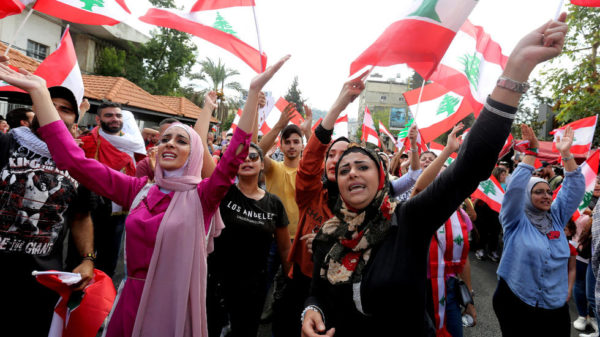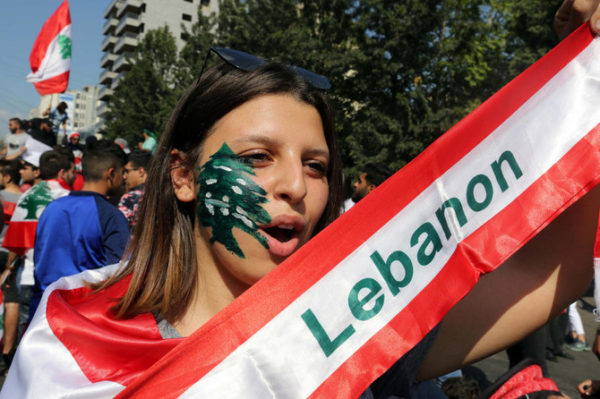In an unprecedented move, the wave of protest against the Lebanese political class has spread to the Shia strongholds in the south of the country. These are dominated by Hezbollah and its ally, the Amal Party, who were considered untouchable up to this point.
Since October 17, a people’s uprising has been targeting the Lebanese government and the political class, considered corrupt and incompetent. It has not waned since and continues to sweep across the entire country. This includes southern Lebanon and Bekaa, the most important Shia electoral strongholds of Hassan Nasrallah‘s Hezbollah and the Amal movement led by the Speaker of the Parliament of Lebanon, Nabih Berri.
“It is a non-partisan socio-political movement that cuts across all social strata, regions and communities, united in the face of fears that the country will fall into the precipice because of the economic crisis,” Middle East political scientist Khattar Abou Diab told FRANCE 24. “All Lebanese are concerned, especially those living in the south of the country, which is predominantly Shia and where the most disadvantaged territories are located.”
In an inconceivable development just a few days ago, demonstrators attacked the offices of some Shia deputies, including Mohammad Raad, president of the Hezbollah parliamentary group, Hani Kobeissi and Yassine Jaber of the Amal party.
Anti-power demonstrators protest

“It is too early to draw any conclusions, as the demonstrations are still ongoing, but it has to be feared that Hezbollah will do everything it can to stop, drown out or take advantage of this popular movement,” Khattar Abu Diab continued. “There have already been several attempts to do so, and even today Hezbollah sent supporters to mingle with demonstrators in the heart of Beirut to create diversions.”
BREAKING
Hezbollah supporters again attempting to infiltrate protests in down town Beirut, attacking men, women and children. #Lebanon pic.twitter.com/jugXQfuXin— Firas Maksad (@FirasMaksad) October 25, 2019
On Thursday afternoon, Hezbollah supporters attacked demonstrators in central Beirut, forcing riot police to intervene to separate the two sides. Several injuries were reported during the clashes by local media.
At the start of the week, hundreds of people, flying Hezbollah and Amal flags and perched on motorcycles, tried to head towards central Beirut, where the anti-power demonstrators are based, before being stopped in time by the Lebanese army.
Fifteen demonstrators were injured on October 23 in Nabatiyah in the south, in clashes with supporters of Hezbollah and its ally Amal.
Day 9 of #Lebanon protest: Pro-Hezbollah partisans attack protestors in Riad Solh Square.
My dispatch for @MiddleEastEye #لبنان_ينتفض https://t.co/FHlX9Tbo7f
— Kareem Chehayeb | كريم (@chehayebk) October 25, 2019
Nabatiyah, a large Shia-majority city, has become the symbol of the uprising in the south of the country, even if the number of demonstrators is lower there than in other parts of the country. Speech is also more measured there than in the capital Beirut, where criticism is more frequent against Nasrallah.
Broken taboo
“Many Lebanese people have risen up in the south of the country, a taboo has been broken because what is today said in public has already been said in private,” confided political scientist and professor at the American University of Paris Ziad Majed to FRANCE 24. “Thus, we now express ourselves even in the South, where some thought that no one would dare to move.”
Even worse, in protest marches, especially in the large coastal city of Tyre, also in the south, the crowd have literally accused Nabih Berri, the very influential Speaker of Parliament and former warlord, of being a “thief” and of impoverishing the country by fostering patronage.
“The street has not only risen up against mismanagement or corruption, the political class has been caught up in the wear and tear of power, hence the rejection of a figure like Berri, who has presided over the Chamber of Deputies since 1992,” said Khattar Abou Diab.
A sign carried by demonstrators in recent days in the capital read: “What was there before Nabih Berri? Adam and Eve!”
But the protests do not only affect Berri, “since to a lesser extent, and especially in Beirut, the demonstrators included Hassan Nasrallah among the other symbols of power,” Khattar Abu Diab pointed out. This is despite Hezbollah’s attempts over decades to seek to sanctify and protect him as a religious leader and leader of the resistance against Israel.
Hezbollah supporters categorically refuse to have their leader’s image associated with politicians accused by the ‘street’ of being corrupt, arguing that Nasrallah has no son who is a minister or a member of parliament, and recalling that Hadi Nasrallah, his eldest son, lost his life at the age of 18 when he fought against Israel in 1997.
Directly criticised by demonstrators from its own community, the Shiite partnership, which is reputed to manage its neighbourhoods and bases well, has tried to respond. In a televised speech on Saturday, the head of Hezbollah said that his movement did not support the idea of a resignation of the government, in which he participates through several ministers. He also called on the demonstrators to exercise restraint.
“If we do not work on a solution, we will move towards a collapse of the country. It will be bankruptcy,” he said.
“This threatening speech and the red lines Nasrallah drew for the demonstrators did not have the desired effect since the demonstrations did not stop, and there are now even more in their ranks,” said Khattar Abou Diab. “This is even true in Nabatiyye, in his own fiefdom in the South, where his word and authority have also somewhat been challenged.”
Can the crisis benefit Hezbollah?
Some people in Lebanon fear that these events will ultimately benefit Nasrallah’s party, which over the years has evolved into a regionally influenced political-military movement and is the only one with an armed wing since the end of the Lebanese civil war in 1990. However, many believe that the current situation will not help them.
“I don’t think Hezbollah can take advantage of the current crisis as some fear, because it is as concerned as others are by the current situation, and it needs the state to cover itself against regional and international threats and pressures,” says Ziad Majed. “The country is, I think, in a situation that worries Hezbollah enormously, as it does the country’s other leaders and political parties.”
“The pro-Iranian party does not want to face the international community alone, while it is under pressure and targeted by American sanctions,” Khattar Abu Diab agrees, explaining its determination to save the current government, which offers it a certain legitimacy.
“This is a turning point, it is even a moment of truth for Hezbollah, because the challenge also requires the establishment of a real rule of law, which requires that the decision on war and peace be in the government’s hands, whereas it is in Hassan Nasrallah’s hands today,” concludes Khattar Abu Diab. “A new page has been turned in Lebanon, regardless of the outcome of the uprising, and I think this will prove to be a setback for all those who refuse to establish a true state of Lebanon.”
This article has been translated from the original, which was in French.
FRANCE24


Leave a Reply
You must be logged in to post a comment.